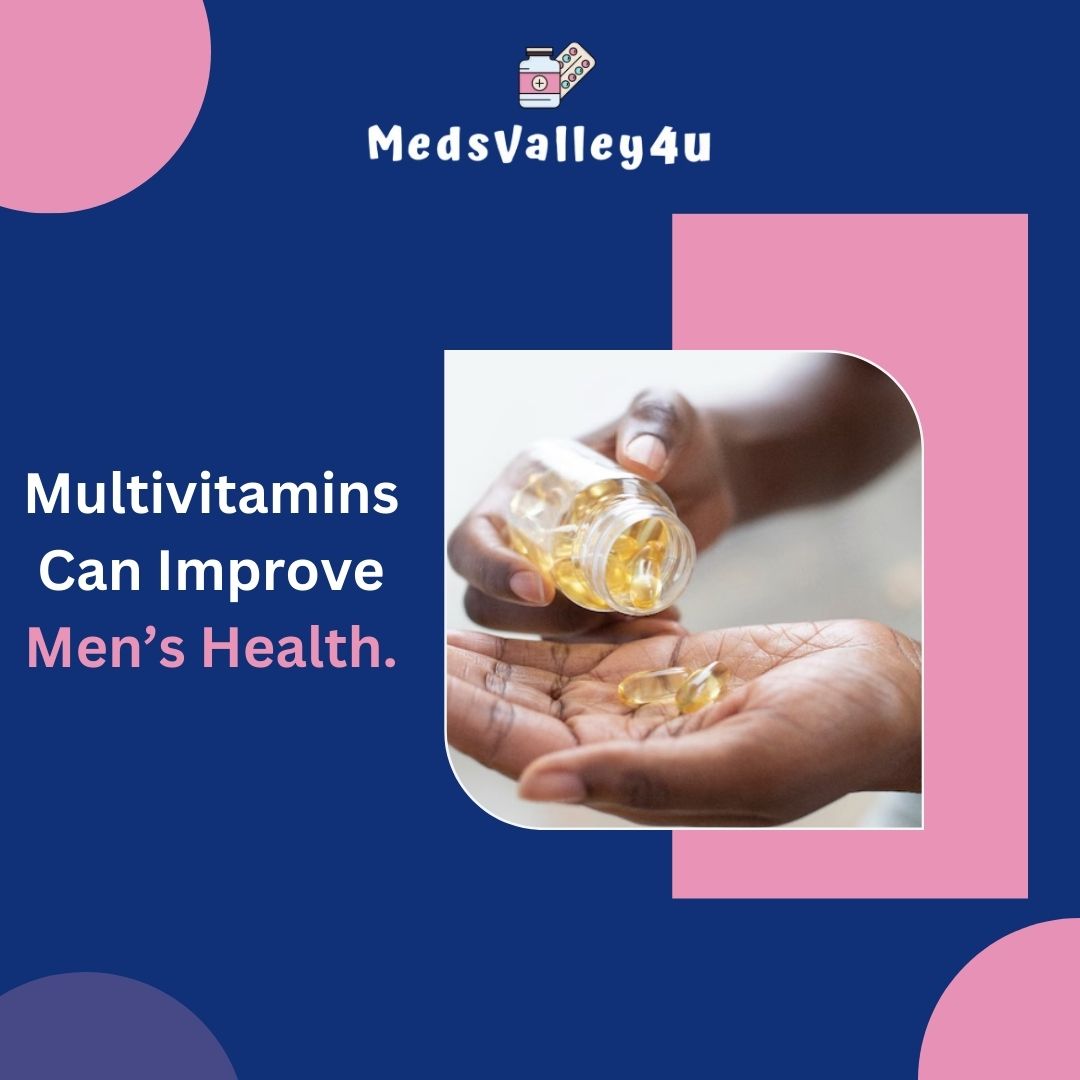Overview of Multivitamins:
Multivitamins are dietary supplements that contain a combination of vitamins, minerals, and sometimes other nutrients intended to supplement the diet. For men, multivitamins can offer several health benefits by filling in nutritional gaps, supporting overall wellness, and addressing specific health concerns. Here’s a detailed explanation of how multivitamins can improve men’s health:
1. Filling Nutritional Gaps
- Dietary Deficiencies: Many men do not consume a balanced diet that includes all essential nutrients. Multivitamins can help bridge these gaps by providing vitamins and minerals that might be lacking, such as vitamin D, vitamin B12, magnesium, and zinc.
- Varying Nutritional Needs: Men’s nutritional needs can vary depending on age, lifestyle, and health conditions. For example, older men may require more vitamin D and calcium for bone health, while younger men might need more B vitamins for energy metabolism.
2. Supporting Immune Function
- Vitamins and Immunity: Vitamins such as C, D, and E are known to support the immune system. Vitamin C acts as an antioxidant and supports immune defense, while vitamin D plays a crucial role in immune function by modulating the immune response.
- Minerals for Immune Health: Zinc, another common component of multivitamins, is essential for the normal development and function of immune cells.
3. Improving Heart Health
- B Vitamins: Folate (vitamin B9), B6, and B12 are essential for heart health. They help reduce levels of homocysteine, an amino acid linked to an increased risk of heart disease.
- Magnesium: This mineral, found in many multivitamins, is important for maintaining normal blood pressure and heart rhythm.
4. Supporting Energy Levels and Metabolism
- B Vitamins for Energy: B vitamins, especially B6, B12, and riboflavin (B2), play a critical role in energy production by helping the body convert food into energy.
- Iron: Some multivitamins contain iron, which is vital for the production of hemoglobin, a protein in red blood cells that carries oxygen throughout the body, thus helping to combat fatigue.
5. Promoting Bone Health
- Vitamin D and calcium are essential for maintaining strong bones. Vitamin D helps the body absorb calcium, which is necessary for bone density and strength.
- Magnesium and Vitamin K: Both nutrients are crucial for bone health. Magnesium is involved in bone formation, while vitamin K supports bone mineralization.
6. Enhancing Cognitive Function
- Omega-3 Fatty Acids: Some multivitamins contain omega-3 fatty acids, which are important for brain health and cognitive function.
- Antioxidants: Vitamins C and E and minerals like selenium act as antioxidants that help protect brain cells from oxidative stress, potentially reducing the risk of cognitive decline.
7. Supporting Prostate Health
- Lycopene and Selenium: Some men’s multivitamins include lycopene, an antioxidant found in tomatoes, which may help reduce the risk of prostate cancer. Selenium, another component, is essential for maintaining prostate health.
8. Enhancing Sexual Health
- Zinc: is important for testosterone production, which plays a key role in sexual health and libido.
- Vitamin E: is an antioxidant that supports blood circulation, potentially improving erectile function.
9. Promoting Eye Health
- Vitamins A, C, and E: These vitamins are essential for eye health. Vitamin A is crucial for good vision, especially in low-light conditions, while vitamins C and E protect against oxidative stress that can lead to age-related macular degeneration.
10. Reducing Stress and Supporting Mental Health
- B Vitamins: B vitamins, particularly B6, B12, and folic acid, are involved in the production of neurotransmitters that regulate mood and reduce symptoms of stress and depression.
- Magnesium: Known for its role in relaxation and stress reduction, magnesium helps regulate neurotransmitters that are responsible for calming the brain.
Considerations Before Taking Multivitamins
- Consult a Healthcare Provider: Before starting a multivitamin regimen, it’s important for men to consult a healthcare provider, especially if they have existing health conditions or are taking other medications.
- Quality and Dosage: Not all multivitamins are created equal. Choosing a high-quality supplement that meets the specific needs of men is crucial. Additionally, proper dosage is important to avoid potential toxicity or interactions with other supplements.
Here are some frequently asked questions (FAQs) related to multivitamins:
1. What are multivitamins?
- Answer: Multivitamins are dietary supplements that contain a combination of vitamins, minerals, and sometimes other nutrients. They are designed to provide a convenient way to supplement your diet and ensure you receive essential nutrients.
2. Who should take multivitamins?
- Answer: Multivitamins can be beneficial for people who have difficulty meeting their nutritional needs through diet alone, such as those with restrictive diets, older adults, pregnant women, or people with certain health conditions. However, it’s important to consult a healthcare provider before starting any supplement.
3. Can multivitamins replace a healthy diet?
- Answer: No, multivitamins should not replace a healthy diet. They are meant to supplement the diet and fill in nutritional gaps, not substitute for a balanced diet rich in whole foods like fruits, vegetables, whole grains, and lean proteins.
4. Are there side effects to taking multivitamins?
- Answer: Most people tolerate multivitamins well, but some may experience side effects like nausea, stomach upset, or diarrhea, especially if taken on an empty stomach. Taking too much of certain vitamins, particularly fat-soluble ones like A, D, E, and K, can lead to toxicity.
5. When is the best time to take a multivitamin?
- Answer: The best time to take a multivitamin is usually with a meal to improve absorption and reduce the likelihood of stomach upset. Some vitamins, like fat-soluble vitamins (A, D, E, and K), are better absorbed when taken with dietary fats.
6. Can I take multivitamins with other supplements or medications?
- Answer: It’s important to check with a healthcare provider before combining multivitamins with other supplements or medications. Some nutrients can interact with each other or with medications, affecting their efficacy or causing side effects.
7. How do I choose the right multivitamin?
- Answer: Look for a multivitamin that meets your specific needs based on age, gender, and health conditions. Check for quality certifications like USP, NSF, or ConsumerLab. It’s also wise to choose a multivitamin with doses close to the recommended daily allowance (RDA) for most nutrients, avoiding excessive amounts.
8. Do multivitamins really work?
- Answer: Multivitamins can be effective in filling nutritional gaps and supporting overall health, but their impact varies depending on individual dietary intake and health status. They are most beneficial for those with specific nutrient deficiencies or increased nutritional needs.
9. How long should I take a multivitamin?
- Answer: The duration of taking a multivitamin depends on individual health needs. Some people may take them long-term, while others may only need them for a short period. Regular check-ins with a healthcare provider can help determine if continued use is necessary.
10. Can I overdose on multivitamins?
- Answer: Yes, it is possible to overdose on certain vitamins and minerals, especially fat-soluble vitamins like A, D, E, and K, which can accumulate in the body. Overdosing on water-soluble vitamins like B and C is less common, but can still cause adverse effects if taken in excessive amounts. Always follow the recommended dosage and consult a healthcare provider.
Read More Articles:
Which Medicines Are Effective for Treating Erectile Dysfunction?
The Primary Six Causes Of Male Erectile Dysfunction
What Women Feel And Think About Sexual Desire?
Is Erectile Dysfunction Associated With Heart And Blood Vessel Disease?
The Top 10 Male Advantages Of Almonds And Walnuts
Are Pineapples Safe For Diabetes Patients to Eat?
What Are the Effects of Tadalafil on Kidneys?
Can Having Sex After a Heart Attack Be Harmful?
The Treatments Available For Male Erectile Dysfunction
What Should You Eat Every day to Stay Healthy?
Aerobic Exercise Has Advantages for Your Health
Basic Understanding About Pain Relief: What You Need to Understand
What You Should Understand about Erections While Massage
Fenugreek: Does It Help In Libido? Studying its Value
Conclusion:
While multivitamins can offer several health benefits for men, they should be used to complement a balanced diet and healthy lifestyle rather than replace them. By addressing nutritional gaps and supporting various aspects of health, multivitamins can play a significant role in maintaining overall wellness and preventing certain health issues.







Write a comment
Your email address will not be published. All fields are required